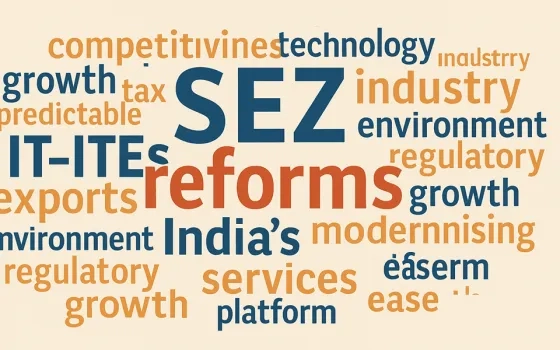Joint Statement Initiative on E-commerce
At the 2017 MC11, 71 WTO members had issued a Joint Statement on Electronic Commerce, committing to explore future WTO negotiations on trade-related aspects of e-commerce. Since then, e-commerce work in the WTO has proceeded along two tracks: multilaterally under the General Council’s and its bodies through the Work Programme and the Joint Statement Initiative. In January 2019, 76 members began negotiations, aiming for a high-standard outcome that builds on existing WTO frameworks.
On July 26, 2024, the Co-conveners of the initiative—Australia, Japan, and Singapore—announced that after five years of negotiations, participants had achieved a stabilised text, with 91 members participating, representing over 90% of global trade. The statement also highlighted the need to support developing countries in implementing the agreement and acknowledged that some digital trade issues remain unresolved.
Some of the key provisions of the agreement include:
Article 4: Electronic Transactions Framework
The article outlines commitments for parties to establish legal frameworks for electronic transactions consistent with the UNCITRAL Model Laws on Electronic Commerce (1996) and Electronic Transferable Records (2017). It emphasizes avoiding undue regulatory burdens and encourages input from stakeholders in developing these frameworks, aiming to facilitate efficient and secure e-commerce.
Impact on Global E-Commerce
The WTO's JSI on e-commerce promotes uniform legal frameworks aligned with UNCITRAL Model Laws, reducing regulatory burdens and enhancing legal certainty. This harmonization simplifies cross-border e-commerce, lowers costs, and streamlines transactions globally, fostering a more predictable and efficient environment for international trade.
Likely benefits for Developing and Least Developed Countries (LDCs)
For developing countries and LDCs, aligning with these standards offers legal certainty, attracting investment and facilitating global market access. Reduced regulatory barriers and modernized trade processes, including electronic transferable records, enable easier participation in global e-commerce, driving economic growth and integration. This could lead to increased adoption of electronic transactions globally, making it easier for businesses to engage in cross-border trade, particularly benefiting MSMEs.
Article 5-8: Electronic Authentication and Electronic Signatures, Electronic Contracts, Electronic Invoicing and Paperless Trading
JSI encourages the use of interoperable electronic authentication and potentially the mutual recognition of electronic signatures. Parties should not deny the legal effect or admissibility of electronic signatures solely because they are electronic. Additionally, the text proposes that parties cannot prevent the use of mutually agreed-upon electronic authentication methods or signatures in transactions, though specific standards may be required for certain transactions.
Further, JSI mandates parties do not deny the legal effect or enforceability of electronic contracts solely because they are made electronically and encourages parties to design electronic invoicing measures to support cross-border interoperability, considering international standards. To promote paperless trading, JSI requires customs authorities to make trade forms available electronically and encourages other government agencies to do the same and that electronic forms should be accepted as legal equivalents of paper forms for import, export, or transit procedures.
Impact on Global E-Commerce
These provisions of the WTO's JSI on e-commerce would have a profound impact on global e-commerce by enhancing legal certainty, efficiency, and interoperability:
- Electronic Authentication and Signatures (Article 5): By recognizing electronic signatures and authentication methods as legally valid, the JSI would facilitate secure and trustworthy digital transactions across borders. This would encourage more businesses to engage in e-commerce, reduce reliance on paper-based processes, and streamline operations globally.
- Electronic Contracts (Article 6): Ensuring the legal validity of electronic contracts across participating countries simplifies cross-border trade, making it easier for businesses to enter agreements digitally without worrying about legal recognition in different jurisdictions.
- Electronic Invoicing (Article 7): Promoting electronic invoicing can enhance the efficiency, accuracy, and reliability of international transactions, reducing costs and improving business operations on a global scale.
- Paperless Trading (Article 8): By moving towards paperless trade processes, the JSI would significantly speed up and simplify cross-border trade, reducing delays, errors, and costs associated with physical documentation. This transition would also support environmental sustainability by minimizing the use of paper.
Likely benefits for Developing Countries and Least Developed Countries (LDCs)
For developing countries and LDCs, these provisions offer several key benefits:
- Access to Global Markets: Legal recognition of electronic signatures and contracts can lower entry barriers for businesses in developing countries, enabling them to participate more easily in global e-commerce and compete with larger international players.
- Improved Efficiency: Adoption of electronic invoicing and paperless trading can enhance the efficiency of trade processes, reducing costs and administrative burdens for businesses in developing countries. This can be particularly beneficial for SMEs, which may lack resources to navigate complex, paper-based systems.
- Capacity Building and Interoperability: Encouraging the use of interoperable electronic systems and international standards can help developing countries and LDCs integrate into global supply chains more effectively. Participation in the JSI can also lead to capacity-building opportunities, enabling these countries to upgrade their digital infrastructure and regulatory frameworks.
Article 9: Single Windows Data Exchange and System Interoperability
JSI focuses on the establishment of single windows for data exchange and system interoperability in the context of international trade. It encourages parties to allow electronic submission of documentation for import, export, or transit through a single-entry point, ideally before the arrival of goods, to expedite processing. The article promotes the use of international standards, such as the World Customs Organization Data Model, to ensure data consistency and security. Finally, it emphasizes the importance of supporting Micro, Small, and Medium Enterprises (MSMEs) by allowing them to use service providers for data exchange.
Impact on Global E-Commerce
By enabling a single-entry point for electronic submission of import, export, or transit documentation, it facilitates faster and more efficient processing of goods across borders. The use of international data standards and the emphasis on system interoperability further contribute to a seamless flow of information, reducing delays and costs associated with cross-border trade. The protection of data and the potential for pre-arrival processing of information also enhance the security and efficiency of global trade operations.
Likely benefits for Developing Countries and Least Developed Countries (LDCs)
JSI acknowledges the importance of Micro, Small, and Medium Enterprises (MSMEs) by encouraging the use of service providers to help these smaller entities navigate complex trade systems. This can lead to greater participation of MSMEs in global e-commerce, driving economic growth and development in these regions. By sharing experiences and working towards harmonized data standards, developing countries can learn from more advanced systems and gradually improve their own trade facilitation processes.
Article 10: Electronic Payments
Emphasizes the need for safe, efficient, and accessible cross-border electronic payments by adopting international standards and promoting system interoperability. The article also addresses the need for transparency in self-regulatory organizations' rules and allows parties to maintain licensing requirements. For those with specific GATS commitments, it mandates national treatment for foreign financial service suppliers accessing public payment systems.
Impact on Global E-Commerce
It will advance global e-commerce by enhancing the safety, efficiency, and accessibility of cross-border electronic payments and promote the adoption of internationally accepted standards and interoperability between electronic payment systems, fostering innovation and competition. By supporting timely and secure electronic payment services, this provision seeks to streamline financial transactions.
Benefits for Developing Countries and Least Developed Countries (LDCs)
By promoting interoperability and competition in electronic payments, these countries can access more secure and affordable payment options, facilitating easier participation in global trade. The article fosters a competitive environment that can drive innovation in electronic payment services, potentially leading to better financial products and services for businesses and consumers in these regions.
Article 11: Customs Duties on Electronic Transmissions
The article addresses the imposition of customs duties on electronic transmissions, which include any data sent electronically. It emphasizes that parties should not impose customs duties on cross-border electronic transmissions but allows for internal taxes or fees if they don't contradict the WTO Agreement. The article also calls for a review after five years to assess its impact and make necessary amendments.
Impact on Global E-Commerce
Article 11 is one of the key provisions that impacts global e-commerce by prohibiting customs duties on electronic transmissions, which helps reduce costs and barriers for digital trade. This fosters a more open and integrated digital economy, facilitating the seamless flow of digital content and services across borders. The article also ensures that internal taxes or fees on electronic transmissions must comply with WTO rules, maintaining a level playing field.
Likely benefits for Developing Countries and Least Developed Countries (LDCs)
Article 11 offers advantages for developing countries and LDCs. By eliminating customs duties on electronic transmissions, it reduces the costs associated with digital trade, making it more affordable for businesses in these regions to access and distribute digital goods and services. This removal of duties encourages greater participation in the global digital economy, opening up new opportunities for international market engagement. Additionally, the clear framework provided by the article ensures that internal taxes or fees on electronic transmissions are consistent with WTO rules, offering a predictable trade environment. However, incoming electronic transactions into LDCs may impact domestic markets and players in the absence of custom duties.
Article 12: Open Government Data
JSI encourages parties to make government data publicly available in digital formats. It outlines requirements for data accessibility, including machine-readability, timeliness, and transparency, and promotes the avoidance of restrictions on the use of such data.
Impact on Global E-Commerce
JSI aims to enhance global e-commerce by promoting the digital availability of government data in machine-readable and open-format data, it facilitates searchability, and usability of information, which can drive innovation and competitiveness. The focus on providing comprehensive metadata and minimizing restrictive conditions for data use supports the development of new products and services
Likely benefits for Developing Countries and Least Developed Countries (LDCs)
By making government data digitally accessible in open formats, these countries can improve transparency and foster economic development. It allows businesses, especially Micro, Small, and Medium Enterprises (MSMEs), to access valuable data for innovation and growth.
Article 14-18: Online Consumer Protection, Personal Data Protection and Cybersecurity
JSI mandates measures to protect consumers from misleading, fraudulent, and deceptive commercial practices in e-commerce. It requires Parties to ensure that suppliers provide accurate information, deal fairly with consumers, and ensure the safety of goods and services. JSI also gives adequate focus on the protection of personal data in e-commerce. It requires Parties to establish legal frameworks for safeguarding personal data, including adherence to international principles and guidelines. It also urges parties to build their cybersecurity capabilities and collaborate on mitigating cyber threats. JSI emphasizes the importance of timely incident response and information sharing to protect electronic networks and foster a secure environment for e-commerce.
Impact on Global E-Commerce
These provisions contribute significantly to global e-commerce by enhancing consumer protection, data security, and trust in the digital marketplace. Participants have emphasized on robust personal data protection, which strengthens trust and ensures users' rights are respected, improving cybersecurity measures and collaboration, addressing evolving threats to safeguard electronic transactions and infrastructure. Collectively, these articles foster a safer, more reliable, and transparent online environment, promoting the growth of global e-commerce.
Likely benefits for Developing Countries and Least Developed Countries (LDCs)
Enhancing consumer trust and protection is crucial for building trust and encouraging e-commerce participation in these regions, development of strong personal data protection laws, which can attract international business and bolster consumer confidence in digital transactions. Development of national cybersecurity capabilities and international cooperation, which is essential for protecting digital infrastructure and mitigating cyber threats in less developed regions.
Article 20: Development
The article outlines the support framework for developing and least-developed countries (LDCs) in the WTO's Joint Statement Initiative on e-commerce. It stresses the importance of bridging the digital divide and supporting inclusive growth by providing technical, financial, and other forms of assistance to help these countries participate in the digital economy. The framework allows them to self-designate provisions requiring up to five years for implementation, with a possible two-year extension. Developed countries are encouraged to assist with needs assessments and coordinate support to prevent overlap. Additionally, LDCs receive a seven-year grace period from dispute settlement under Article 27, with temporary relief also available for developing countries with extended implementation periods.
Impact on Global E-Commerce
It supports bridging the digital divide and encourages the development of digital infrastructure and ecosystems. By focusing on technical assistance and capacity building, the article aims to enable all Parties to better participate in e-commerce, fostering a more integrated and balanced global digital economy.
Likely benefits for Developing and Least Developed Countries
- Technical Assistance: Provides targeted support to help implement the Agreement’s provisions, including technical and financial aid.
- Extended Implementation: Allows additional time for developing and least-developed countries to implement provisions, with potential extensions up to two years.
- Needs Assessments: Encourages developed countries to assist with assessing and addressing capacity gaps in developing and least-developed countries.
- Coordinated Support: Promotes coordination of assistance to avoid overlap and maximize effectiveness, including considering regional and private sector needs.
- Dispute Settlement Relief: Grants a seven-year grace period for least-developed countries from dispute settlement under Article 27 and temporary relief for developing countries.
- Transparency: Encourages sharing of information on technical assistance programs to ensure they meet the actual needs of developing and least-developed countries.
Article 21: Telecommunications
JSI focuses on improving telecommunications regulation to support global e-commerce. It defines key terms like "essential facilities" and "major supplier" and sets out obligations for telecommunications authorities. Authorities must be independent of service providers, transparently manage frequency band assignments, and ensure fair access to essential facilities. Suppliers must have recourse to resolve disputes regarding access to these facilities. The article aims to foster competition and efficient service provision in telecommunications.
Impact on Global E-Commerce:
Article 21 aims to enhance global e-commerce by ensuring competitive telecommunications infrastructure. It requires that regulatory authorities operate independently from service providers and that frequency bands are assigned transparently. Major suppliers must provide access to essential facilities on fair terms, promoting competition and efficiency in telecommunications.
Likely benefits for Developing and Least-Developed Countries:
This will benefit developing and least-developed countries and their companies by promoting reasonable, fair, non-discriminatory and transparent access to crucial telecommunications infrastructure and transparent regulatory practices in bigger markets. The provision for dispute resolution also ensures that issues related to access can be addressed effectively.
Article 28: Committee on Trade-Related Aspects of Electronic Commerce
Establishes a Committee on Trade-Related Aspects of Electronic Commerce, open to all parties of the agreement. The Committee, which is to meet at least annually, will be responsible for overseeing the implementation and operation of the agreement, including monitoring technical assistance and capacity-building programs. WTO members like India, which are not part of the agreement, can participate in the committee as observers upon request.










